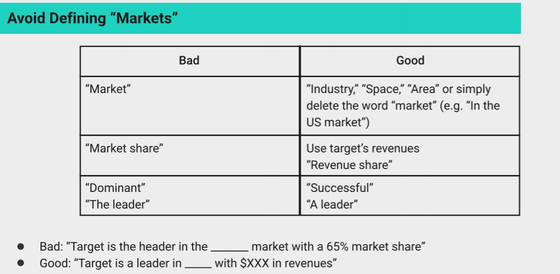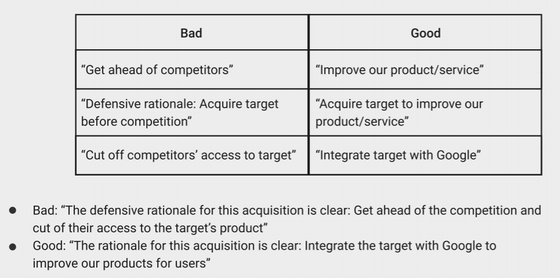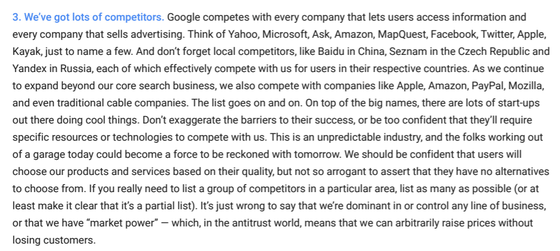It is pointed out that it is difficult to even think about antitrust law inside Google due to 'media blackout'

Google has filed a number of antitrust lawsuits from US regulatory agencies, but on the other hand, it is promoting measures such as replacing the upper part of Google search results with 'Google-owned website', and it is monopolized. I continue to pretend not to worry about antitrust lawsuits.
Googlespeak ™ --How Google Limits Thought About Antitrust
https://zyppy.com/googlespeak/
Regulators around the world have expressed concern about Google's monopoly, and the antitrust lawsuits and regulations facing Google are diverse. Even if you focus on talking to the most recent ones, search and retrieval in the illegal maintenance of a monopoly in the advertising market from the United States Department of Justice filed in or is, antitrust violations in the United States search market in the 38 states of the judicial authorities sued or , from the French authorities on suspicion of antitrust violations in the payment of the news royalties investigation or receive, antitrust violations from the Indian regulatory authorities around the Google pay investigation or receive a monopoly in collusion with Facebook that had maintained the suspicion or subjected to, in the antitrust violations from the European Commission about the new system of development stageinvestigation or receive a new regulatory method for the force of its own payment system in Google Pay is in the United States submitted the There is no end to the list.
In this way, it can be said that Google has been criticized from all over the world for antitrust law, but on the other hand, we are continuing to promote measures to make the upper part of Google search results a website owned by Google. The following article shows the fact that when using Google Search, users have to scroll about 42% of the entire page to reach a non-Google website.
It is pointed out that the top search results of Google are occupied by 'Websites owned by Google' --GIGAZINE

From the above, even though Google has many problems related to antitrust law, it seems that they do not care about those problems. According to Shepherd, who argued with multiple Google employees on Twitter, these Google employees made repeated statements such as 'ridiculous,' 'unfounded,' and 'stupid' about alleged antitrust violations. So, it seems that the attitude that the issues related to the antitrust law are not actually regarded as important within Google can be seen through.
Shepherd argues that this attitude is due to 'Google's internal media blackouts.' Evidence to support that claim is Google's internal document, Five Rules, obtained by The Markup, an American nonprofit organization on ethics in technology.
five-rules --Five-Rules-of-Thumb-for-Written-Communications.pdf
https://s3.documentcloud.org/documents/7016657/Five-Rules-of-Thumb-for-Written-Communications.pdf
Five Rules is a guideline that summarizes precautions for internal communication, but as you can see from the beginning sentence 'Words are important, especially in antitrust law', it should be in conflict with antitrust law. The content is to refrain from various expressions and phrases. For example, Article 1 says, 'Help your users, not hurt your competitors. Don't pay attention to how they affect your competitors. We' crush, '' kill, 'and' hurt. ' 'Don't do bad things or things that you think are bad, such as' interfering '.' I am trying to make you think that it is.

In addition, the following document, 'Communicating Safely,' provides specific examples of words that should not be used and words that should be used.
Communicating-Safely.pdf
According to this document, 'Market (market),' 'Market share (market share),' 'Dominant (Exclusive)' and the like is inappropriate, 'Industry (industry)', 'Revenue share ( revenue-sharing ),' 'Successful (success ) ”Is treated as appropriate.

In the example sentences, the phrase 'Get ahead of competitors' is inappropriate, and the phrase 'Improve our product / service' is appropriate. The phrase 'Defensive rationale: Acquire target before competition' is inappropriate and 'Acquire target to improve our product / service.' You can see that the expression 'to do)' is appropriate.

One of the most important points in Google's media blackout is that 'Google does not think that it is exclusive to itself.' In Article 3 of the Five Rules mentioned above, Google lists Yahoo, Microsoft, Ask, Amazon, MapQuest, Facebook, Twitter, Apple, Kayak, Baidu, Seznam, Yandex, PayPal, Mozilla, etc. as examples of competitors. , 'Google competes with every company that lets users access information and every company that sells advertising.' .. Google is a huge company that occupies 92% of the search market, but if you consider all kinds of information and advertising industries as competitors, you can not say that it dominates the market.

Shepherd said, 'For example, if Netflix offers customers free pirated movies, or Amazon makes every book on the Kindle free, it's good for users, but it's good for users, but it creates works. It will have a devastating impact on writers, artists, and competitors, 'he said, claiming that Google is trying to replace strategies that hurt competitors with' good for users. ' Six Google employees said, 'There was a tacit understanding that we shouldn't talk publicly about antitrust issues within Google,' said The New York Times article . As a result, he pointed out that there were no problems with the Antimonopoly Act. This situation is described in the classic masterpiece of the dystopian novel George Orwell's ' 1984 ', a fictional language 'Newspeak ' that limits vocabulary and thoughts in order to solidify the rule of the party. We call it 'Google Speak'.
Related Posts:
in Web Service, Posted by darkhorse_log






